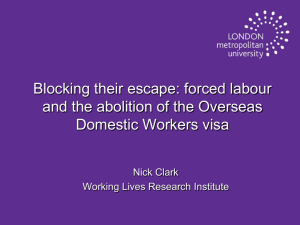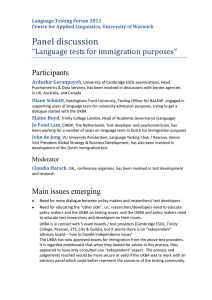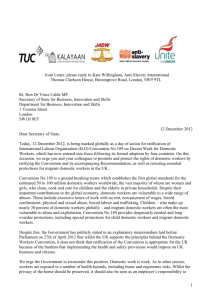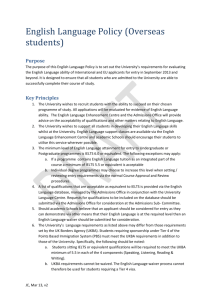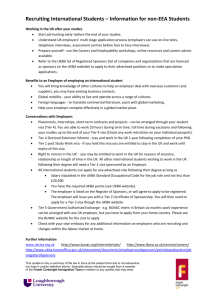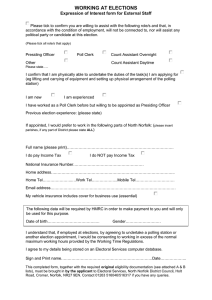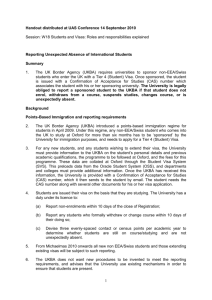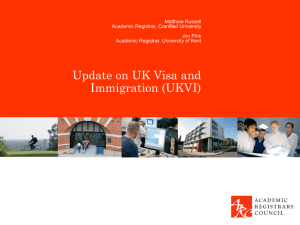Background: migrant domestic workers
advertisement
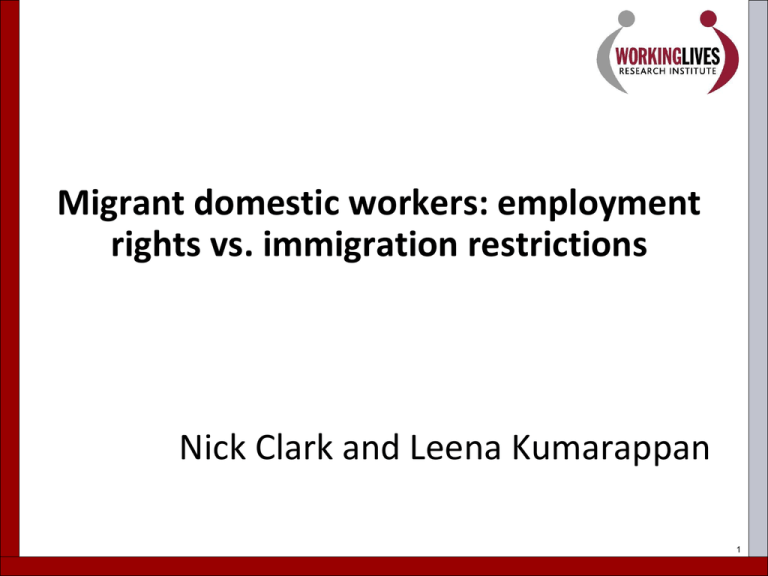
Migrant domestic workers: employment rights vs. immigration restrictions Nick Clark and Leena Kumarappan 1 Our Project : Migrant domestic workers’ employment rights in Britain Funded by the Nuffield Foundation 2 Background: migrant domestic workers pre-1998 : could come to UK with specific employer - no route to settlement (Indefinite Leave to Remain). Leaving abusive employer → undocumented Long campaign (TGWU, Kalayaan & others) 1998 provisions changed by New Labour - could change employer (not workers in diplomatic households) + route to settlement. Since 2002: provisions part of “immigration rules”. 3 UKBA procedures Overseas Domestic Worker Visa (max 12 mths): • 18-65 , employed as a domestic worker for min. one year prior to application “under the same roof” as employer • travel to UK in company of employer, or employer's family member(s) • work full time as a domestic worker only • no recourse to public funds 4 UKBA procedures evidence required from employers : – written confirmation of terms and conditions of employment (model form available to be signed by worker & employer) – undertaking to accommodate and maintain employee in the UK – statement indicating compliance with minimum wage (but visa applications cannot be refused if they do not respond) 5 UKBA procedures To change employers: – Notify UKBA with reasons – terms & conditions, commitments from new employer Renewal – Repeat process (valid for up to 12 months) 6 Organisation & support Kalayaan – established in 1987 – now a charity (Barrow Cadbury, Big Lottery) Unite (TGWU) – organising domestic workers (International Hotel & Catering branch) Justice for Domestic Workers (J4DW) – – – – self-organised set up in 2009 campaigning & organising ESOL, IT (via Unite), employment rights and mutual support 7 Enforcement routes NMWI - excl. worker treated as part of family (provision of accommodation, meals and sharing of tasks and leisure activities). HSE - excl. domestic households, and WTR in respect of breaks & hols UKBA - no checks, inspections or notification of enforcement agencies ET – for employees, limited enforcement powers (lawful contract) County Court – employer must be in UK (lawful contract) Anti trafficking – lack of redress (Kawogo case) Forced labour – s71 Coroners & Justice Act 2009 (1/4/10) 8 Method •Seek written terms and conditions of employment – either from the workers where they have them, or from the UKBA through Subject Access Requests. •Analysis of reported terms and conditions of employment through Unite Migrant Domestic Worker terms and conditions of work survey •Semi-structured interviews with about 30 workers to investigate the actual conditions of employment 9 Through the semi-structured interviews we explore: •Previous awareness of the statement given to UKBA; •Actual pay and conditions (and supporting documentation such as pay slips, where provided); •Awareness of their employment rights; •Awareness of the possible means of enforcing those rights; •Views on using the various means of enforcement of rights. 10 Contracts retrieved from UKBA (n=64) 11 Data from UNITE survey Calculated hourly pay with and without a written contract (n = 56) 12 Data from UNITE survey Calculated hourly pay with and without a payslip (n = 54) 13 Interviews “I have been fighting, not for money, but for dignity” Female, Filipina, 30-39 “I said: I am legal in this country - you are not the only employer” Female, Filipina, 30-39 14 “Sometimes I feel upset about my salary, but I did not demand about that because I have a part-time job. It can cover my – I can get more than the £800 that they pay me. I work ten hours.” Female, Filipina, 50-59 15 “she started to move all the nanny’s job to me – ‘you have to do this, you to do this’ and it was a short time for my visa and I said what can I do – just to keep quiet.” Female, Moroccan, 40-49 16 “[I work] 11 hours a day ... five and a half days, that’s 61 hours a week. [contract says 40 hours] I just agree with that one, you know, because I don’t have any choice, I don’t want to tell anything, you know. Because that’s the thing they want.” Female, Filipina, 30-39 17 Conclusions & prospects going rate and labour markets payslips as indicator of exploitation state knowledge of unlawful behaviour manufacture of unlawful contracts by immigration rules value of written terms and conditions future of Overseas Domestic Worker visa 18
